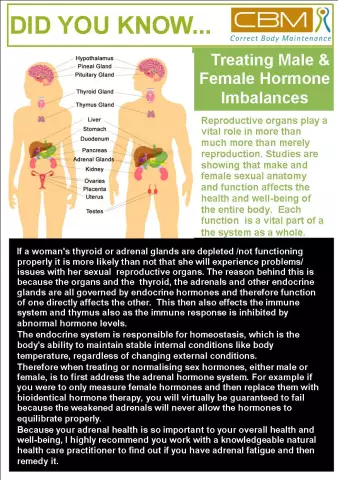- Author Curtis Blomfield blomfield@medicinehelpful.com.
- Public 2023-12-16 20:44.
- Last modified 2025-01-23 17:01.
There are two main mechanisms of regulation of organs and systems in the human body: nervous and humoral. The first of them is carried out, thanks to the abundant innervation of all internal organs, glands, blood vessels and the musculo-ligamentous apparatus.

The second mechanism operates due to the distant action of hormones, in which they are produced in the endocrine gland, and then transferred with the bloodstream to the target tissue or organ. So, the hormone testosterone, the main androgen, is produced in a small amount in the adrenal cortex, and when puberty occurs in boys, it begins to be actively produced in the testes, then it is released into the blood through the excretory ducts from the glands and then has an effect on the musculoskeletal system, and also on liver metabolism. By the feedback principle, testosterone is able to regulate the production of other sex hormones (both in the female and in the male body).

Testosterone Functions
Testosterone levels inmen, of course, far exceeds its level in women, because in the male body it performs more functions: in the puberty period in boys, under its influence, the formation of the so-called. secondary sexual characteristics, namely: “breaking” of the voice, expansion of the shoulder girdle in comparison with the pelvis, increase in muscle mass and compaction of bones, maturation of gametes in the gonads.

In adult men, it also helps to maintain sexual function, that is, sexual desire, potency and forms psycho-physiological sexual behavior. The hormone testosterone is also produced in women: in the adrenal cortex, ovaries and by converting estrogens. It has an inhibitory effect on the maturation of follicles in the ovaries and regulates the production of estradiol and estrone through the hypothalamic-pituitary-adrenal system. With its hypersecretion in women or the artificial intake of drugs containing this hormone (many anabolic steroids), women develop masculinization, manifested in a coarsening of the voice, increased body hair, muscle development and aggressive behavior.
Regulation of testosterone secretion
There are several mechanisms that affect testosterone levels. Its norm in men is 11-33 nmol / liter, and in women it is only 0.24-2.7. sex hormones (SHBG). However, only free(makes 2% of the total) and albumin-bound testosterone. After 30-35 years in men, the hormone testosterone, both its bioavailable and total fractions, tend to decrease at an average rate of 2-3% / year, and in old age, the level of active testosterone is reduced by 5 times (compared to youth), and the total - 2.5 times. According to some reports, this is due not only to a gradual decrease in its secretion, but also to increased binding to SHBG, as a result of which the bioavailable fraction is deactivated.






